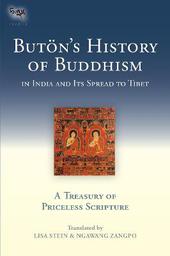
|
Buton's History of Buddhism in India and Its Spread to Tibet: A Treasury of Priceless Scripture
Hardback
Main Details
| Title |
Buton's History of Buddhism in India and Its Spread to Tibet: A Treasury of Priceless Scripture
|
| Authors and Contributors |
By (author) Buton Richen Drup
|
|
Translated by Lisa Stein
|
|
Translated by Ngawang Zangpo
|
| Series | Tsadra |
|---|
| Series part Volume No. |
12
|
| Physical Properties |
| Format:Hardback | | Pages:464 | | Dimensions(mm): Height 234,Width 157 |
|
| Category/Genre | Religion and beliefs
Buddhism |
|---|
| ISBN/Barcode |
9781559394130
|
| Classifications | Dewey:294.30954 |
|---|
| Audience | |
|---|
|
Publishing Details |
| Publisher |
Shambhala Publications Inc
|
| Imprint |
Snow Lion Publications
|
| Publication Date |
20 August 2013 |
| Publication Country |
United States
|
Description
"This 14th century lively history introduces basic Buddhism as practiced throughout India and Tibet and describes the process of entering the Buddhist path through study and reflection." This 14th century lively history introduces basic Buddhism as practiced throughout India and Tibet and describes the process of entering the Buddhist path through study and reflection. In the first chapter, we read about the structure of Buddhist education and the range of its subjects, and we're treated to a rousing litany of the merits of such instruction. In the second chapter, But introduces us to the buddhas of our world and eon, three of whom have already lived, taught, and passed into transcendence, before examining in detail the fourth, our own Buddha Shakyamuni. But ells the story of Shakyamuni in his past lives, then presents the path the Buddha followed (the same that all historical buddhas, including future ones, must follow). Only at the conclusion of the discussion of the result enlightenment do we return to the specific case of the Buddha and his twelve deeds. This marks the start of the history of the Buddha as most of us imagine it. After the Buddha's story, But ecounts three compilations of Buddhist scriptures, and then quotes from sacred texts that foretell the lives and contributions of great Indian Buddhist masters, which he then relates. The chapter concludes with the tale of the Buddhist doctrine's eventual demise and disappearance, a concept and a tale squarely within the Mahayana. The final chapter, the shortest of the three, gives an account of the inception and spread of Buddhism in Tibet, focused mainly on the country's kings and early adopters of the foreign faith. The watershed debate at Samy Monastery between representatives of Chinese and Indian styles of Buddhist practice is given the most attention in this chapter. An afterword by Ngawang Zangpo, one of the translators, discusses and contextualizes But exemplary life, his turbulent times, and his prolific works.
Author Biography
RINCHEN DRUP (1290-1364) has been the role model for many of Tibet's greatest masters over the centuries, including the present Dalai Lama. He was a simple monk and a dear spiritual friend of all, high and low, and he embodied the highest degree of Buddhist scholarship and mastery of meditation. Lamas of all denominations still commonly refer to him as "omniscient But" LISA STEIN is a disciple of Thinley Norbu Rinpoche and Lama Tharchin Rinpoche. NGAWANG ZANGPO (Hugh Leslie Thompson), a Tsadra Foundation fellow, is a disciple of many Kagyu, Shangpa, and Nyingma masters. This is his fourth book translated under the auspices of the Tsadra Foundation.
|